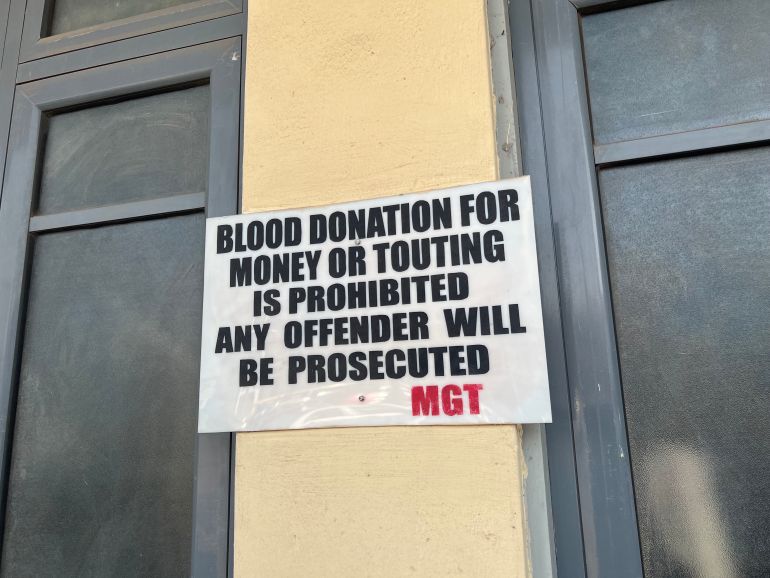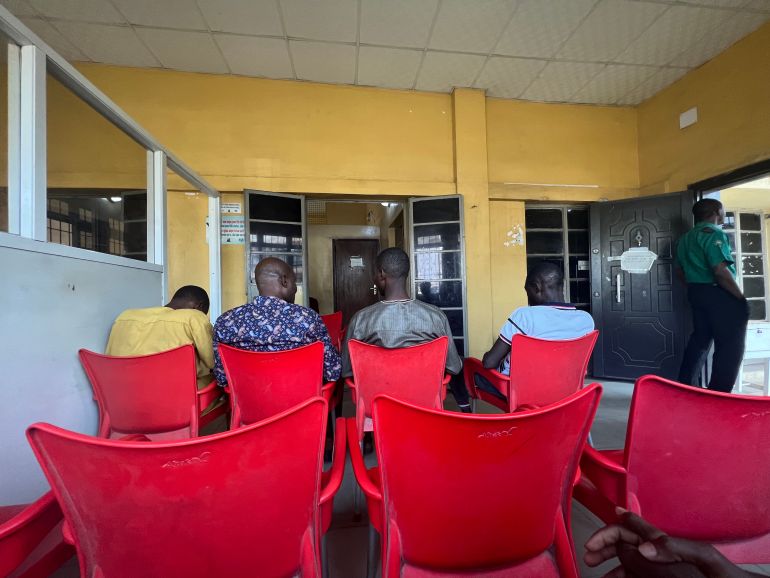Ibadan, Nigeria – A wave of red corrugated roofs welcomes visitors to the city of Ibadan in southwest Nigeria. Inside the 200-year-old city’s centre, incessant traffic winds through narrow, unpaved roads and past crowded open-air markets.
At the edge of the city, Opeyemi Dasola’s home, a square fortress of cement, is a calm oasis. Dasola, a streetside cheese seller, is a quiet soul, and the only sound in her living room is the gentle hum of the air conditioner circulating air through the sparsely furnished space.
But just a week earlier, this house was rocked with chaos. Fowarogun, Dasola’s 17-year-old daughter, had woken at midnight with a shooting pain starting in her feet and eventually engulfing every part of her body. The girl was frightened, but Dasola already knew what was causing the problem.
Fowarogun had been diagnosed with sickle cell anaemia, a hereditary condition that limits the supply of oxygen to the blood, when she was four years old. The disorder occurs due to clusters of sickle-shaped red blood cells, which can obstruct blood vessels, hindering blood flow around the body. It can shorten life expectancy by 20 to 30 years in many countries, but in Nigeria, about 80 percent of sufferers do not even make it to the age of five. The mean age of death for those who do is currently just over 21.
This is a condition that Fowarogun’s mother has learned to manage by giving her daily folic acid supplements and avoiding extreme temperatures. Nevertheless, roughly every three years, Fowarogun requires a blood transfusion to keep her healthy.
Obtaining blood for her daughter is a source of great anxiety for Dasola. Severe blood shortages have left patients in Nigeria scrambling to find their own private donors, a practice that is illegal, according to the country’s blood regulator, the National Blood Transfusion Commission. The unmet demand for blood, however, has spawned a black market in which people donate blood for profit and where there are few regulations to ensure the blood is free of disease and safe to use.

With a population of 200 million people, Nigeria requires an estimated 1.8 million units of blood each year for patients who have been in accidents, undergo surgery and need it to treat conditions such as anaemia and other genetic blood disorders. However, each year, only about 500,000 pints (236,600 litres) of blood are collected through official channels. Nigerians are often reluctant to give blood because of beliefs that donating it will make them sick or will weaken men’s libidos.
The National Blood Transfusion Commission faces other challenges besides low supplies. Lack of funding is a major problem, Amedu Omale, the commission’s former director general, told Al Jazeera shortly before he retired in August.
He said it will cost an estimated $15m to reform the system but it has received only $50,000 from the government since its creation in 2021 by the National Assembly. Before the commission, Nigeria’s blood service was run by the National Blood Transfusion Service, which was created in 1990 and was merely a task force under the Federal Ministry of Health and Social Welfare without much decision-making power. Al Jazeera contacted the ministry for comment but received no reply.
A spokesman for the National Blood Transfusion Commission told Al Jazeera that after the agency was established, the government quickly became preoccupied with the COVID-19 pandemic and the cost of living crisis but the commission hopes to conduct its own fundraising drives in 2024.
‘Family replacement’
With adequate funding, the commission could build a centralised blood collection system in which blood from donors could be screened and separated into components to avoid waste. Blood could also be stored in the right conditions and sorted so it would be ready for delivery to hospitals when needed. There would also be a system to allow hospitals all over the country to coordinate with each other to share blood supplies.
Instead, the lack of such a system has forced most hospitals to source blood through a problematic practice known as “family replacement”, in which patients must find a family member to donate the same amount of blood that has been used for the patient. The people donating will typically have to answer a questionnaire about their health, sign an agreement and then donate blood. The blood type does not have to match.
People who do not have a family member available to donate will need to find someone who they can pay who will pose as a family member – the hospitals do not check ID. Most hospitals impose a deadline of three to seven days and will not approve a patient for discharge until the blood has been replaced.

“Family replacement is not ideal because it creates shortcuts and discourages voluntary donation,” said John Aneke, a professor of haematology at Nnamdi Azikiwe University in the southeastern state of Anambra. This system is frowned upon by the public health community, he said, because it helps promote commercial donations from donors who engage in risky lifestyles and increases the risk of transfusion-transmitted infections, such as hepatitis.
The requirement that blood replacements must be found before patients are discharged also puts immense pressure on patients, whose bills from spending extra days in the hospital will continue to accumulate. Many end up turning to social media to appeal for donations and to illegal commercial donors or “racketeers”.
Commercial donors give blood to earn cash and are normally contacted by middlemen who broker deals between them and the patients. A donor is advised to donate no more than twice a year, but because this practice is illegal, it is not regulated in any way. Many commercial donors donate blood much more frequently than this.
Oloyede Adebola, a 37-year-old mother of two, has had to deal with racketeers twice. Talking to Al Jazeera at her home in Sarumi, a quiet neighbourhood in Ibadan, she explained that her eight-year-old daughter suddenly fell ill in 2021 and received a transfusion at an Ibadan hospital that then refused to discharge the girl until the blood was replaced. Like most Nigerians, she prefers not to donate blood, so she was connected by a friend to a network of middlemen, which in turn connected her to a commercial donor. Adebola told the hospital this man was a relative and paid $23 for donating a pint (nearly half a litre) of blood – three times her monthly earnings. The middleman took half the money.
There are some privately run blood banks in Nigeria, but not all are registered with the National Blood Transfusion Commission and are, therefore, unregulated.
This causes an additional layer of anxiety for patients and their families who worry about the quality of blood they are receiving, especially for economically disadvantaged families who receive blood via clinics that don’t have state-of-the-art facilities and are not regulated.
There is no way to be sure that this blood has been checked at all, let alone collected and stored in accordance with proper medical practice. Patients also worry about the extra costs because they have to pay for the screening of the blood as well.
The commission itself does not have the resources to monitor these blood banks or oversee screenings of blood used by hospitals that has been sourced by patients themselves.

Commercial blood donations carry a penalty of six months in prison. In reality, however, few people have ever been prosecuted.
Even in Lagos, where the blood donation service receives higher funding than the one in Ibadan and where blood donations are screened and tracked, only two clinics have been shut down for operating without a licence. One prosecution is currently going through the courts but has dragged on for five years because of backlogs in the court system.
Ideally, Omale said, the commission aspires to transform all six regional blood transfusion services from mere donation centres to resources similar to the Lagos State Blood Transfusion Service, which carries out regular inspections of blood banks and hospitals to ensure that they follow safety guidelines.
For now, most hospitals cannot even verify the identity of donors. The process of doing so is just too far down the list of priorities that the commission needs to meet. Its primary focus is on meeting the demand for blood, which currently outstrips supply by 75 percent in Nigeria, according to the World Health Organization.
While enforcement of blood donation regulations is “the next phase in the plan”, Omale says, the commission is currently throwing its energies into advertising campaigns across the country to encourage voluntary blood donations through official channels.
In the meantime, the use of commercial blood donors remains a thriving business in most parts of the country.

At Ibadan University College Hospital, the region’s main government hospital, a nurse and a janitor who spoke to Al Jazeera on the condition of anonymity confirmed that most people who come to donate blood are commercial blood donors.
These donors, overwhelmingly men, are usually contacted by a middleman and paid to pretend to be relatives of patients. One of the donors waiting at the clinic, a motorcycle taxi driver, told Al Jazeera that he donates blood at least twice a year in exchange for money and has been doing it since 2017.
“The price for donating blood changes depending on how I negotiate. Normally, I earn $10 from donating a pint of blood,” he said. “That’s double what I can earn on a good day if I work for 10 hours straight.”
A family in debt
To pay for Fowarogun’s emergency blood transfusion this year, Dasola took out a loan of $70 from a local lender who she frequently turns to whenever she needs a bailout. She had agreed to pay $3 a day for 24 days on the condition that missing a single payment would double her daily payment to $6. And if she failed to pay the lender back in full, he said he would show up at her house to cause a scene and seize her furniture. He even threatened to have her arrested for the debt.
On the one occasion Dasola could not afford to pay, Fowarogun’s 25-year-old brother, who works in aluminium manufacturing, was able to step in. He then became the guarantor for the loan – another issue that causes anxiety. “I am not happy about my condition,” Fowarogun said. “I get teary when I think about how burdensome it has been for my family.”
Fowarogun faces a future of constantly “chasing” safe blood. The teenager says she’s given up on her dream of becoming a nurse because her family can’t afford to pay for more schooling when they have already fallen into debt because of her medical treatment.
Dasola, preoccupied by a stack of medical receipts tucked into a maroon Bible on the family’s living room table, said that while she’s glad her daughter is healthy for the time being, she’s not sure how she’ll pay for the future blood transfusions that Fowarogun will inevitably need.
“I fear for my daughter,” Dasola says. “Her condition has taken a major toll on my health too because of stress and family finances. This would not be our situation if blood was readily available and safe.”
Additional reporting by Linus Unah Source: Al Jazeera
Stay informed with The Namibian – your source for credible journalism. Get in-depth reporting and opinions for
only N$85 a month. Invest in journalism, invest in democracy –
Subscribe Now!









